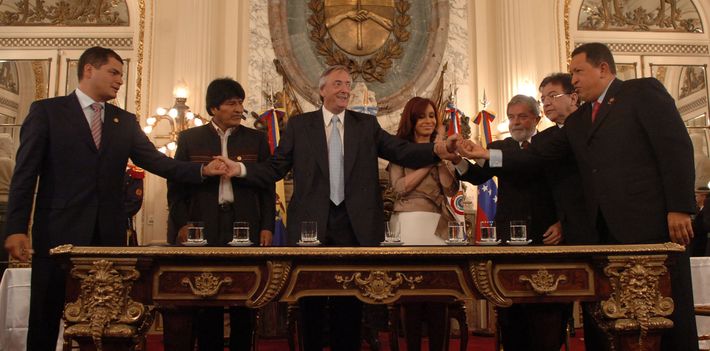
EspañolMany are astounded by the fact that Venezuela is so deeply entrenched in poverty considering its wealth of natural resources.
Even the most elemental necessities are scarce now, from toilet paper to groceries to medicine. Nearly everyone has suffered, and many have died, most notably children.
More developed countries realized centuries ago that prosperity comes from the ideas, habits and laws that promote progress. In other words, prosperity comes from the nation’s spirit.
A scientific mentality is one of the distinctive traits of developed countries. Experience passed through the filter of reason is what drives both individuals and world leaders. They don’t let rhetoric seduce them; they rigorously investigate and fact-check claims.
Montesquieu claimed laws play the biggest part in the people’s welfare. Good legislation drives progress, both individually and for all the country; bad legislation brings widespread misery. Legal institutions drive their roots into the habits and doctrines dominant in a certain country.
Max Weber analyzed the traits of different people that have reached — for the good or bad of their fellow citizens — an elected political office. It was he who described the idea of a charismatic leader, certain people who stand out for being unusual in a way that is hard for others to imitate.
Charisma is an intense magnetism projected on others at an emotional level. The charismatic leader is a good communicator, persuasive and egocentric. He adapts his language to the traits of the people to which it is directed. He exerts his power through verbal persuasion and emotional excitation.
These kind of leaders to be dangerous because they frequently stir up fanaticism among followers.
- Read More: Uruguay’s Biggest, Dirtiest Lie: Pepe Mujica
- Read More: Uruguayan Journalists Denounce Government Persecution
Hugo Chávez was a charismatic leader and he sunk Venezuela into poverty and despair. José “Pepé” Mujica was too, having set Uruguay off on a similar path. In both cases, this was possible because the culture and habits of Latin Americans was susceptible to the appearance of these so-called caudillos.
What happened with Chávez is well known. Not so much with Mujica, because Uruguay is still in an earlier stage of the same process.
Mujica ruled the country between 2010 and 2015. Most of that time, the price of exports reached levels similar to that of the 1950s. Consequently, public income grew exponentially.
However, the fiscal deficit in January 2015 was 3.6 percent of GDP, the same as it was in December 2002 — the year in which a bank crisis swept the country.
So how was this new money administered? There was colossal waste. The priority of the Mujica administration was to benefit friends, sympathizers, to perpetuate power and to create the Chavista-Cuban model.
This money didn’t belong to the president, but rather to taxpayers, and yet he administered it as if it were his own.
Mujica acknowledged he had told the heads of public companies to invest as much as they could without listening to the Economy Minister, who had the job of “trimming” things down.
Among the many dreadful decisions taken by Mujica, these are the ones that stand out:
- Naming somebody to the state oil company Ancap who was notoriously unprepared to direct it. As a result, he bankrupted it, and nearly had it shut down for good. The bail-out costed taxpayers somewhere between US$800 million and $1,2 billion.
- Ancap’s dire state of affairs was known through the only legislative commission on the matter that the ruling party allowed. Mujica declared that it had been a grievous mistake to authorize it. This is why the real situation of the rest of state-owned companies is unknown, although it’s suspected to be similarly in the red.
- He created a fund to finance workers cooperatives and other projects that he claimed shouldn’t be measured with an “narrow economic criteria.” Fondes was “his candle to socialism” as he put it.
The final result of such “philosophy” has been that Fondes granted credits to the tune of US$70 million to 28 companies, in many cases breaking laws related to this. At the end of Mujica’s term, there was a huge unpaid debt and the next leadership had to cut its loses for 60 to 70 percent of the organization’s capital.
- Under Mujica’s rule, 33,361 more public employees were hired. Keep in mind that Uruguay’s population is just 3.3 million people. In the electoral year, 9.384 were hired, meaning the state now employs one fifth of all workers.
- He hastily closed Pluna, the Uruguay state airline, but then created a new one, Alas-U, with former Pluna workers. These workers were given privileged conditions because they enjoyed an unemployment subsidy for three years (normally six months). Fondes gave them a US$15 million loan with nearly no guarantees. In total, the state spent US$24 million on the change.
A mere two months after starting its operations, the airline faced serious financial difficulties that made it cancel flights, raising doubts about whether it can function.
Right now, Uruguay’s fiscal deficit is four percent of GDP, inflation is over 10 percent, unemployment in the private sector is rising, companies face mounting difficulties to remain open and people’s real income is nosediving.
Charming Latin American leaders, like snake charmers, will keep captivating foreigners with their speeches against capitalism and consumerism. And simultaneously, the countries ruled by them will continue to suffer the consequences of so much “cheap philosophy.”
 Versión Español
Versión Español












